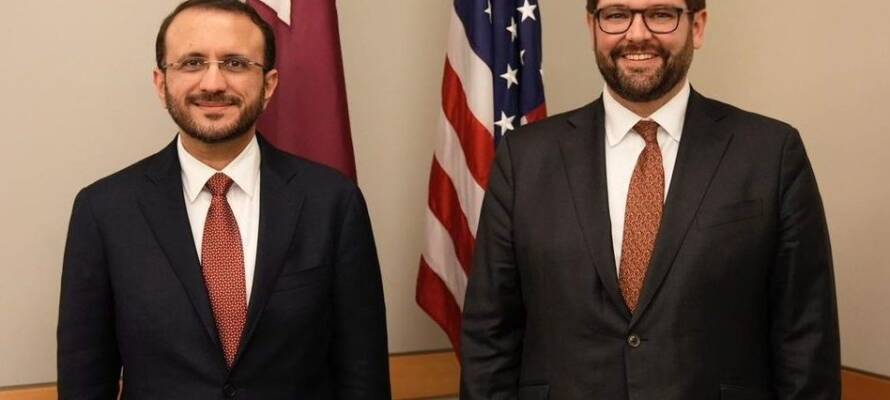Qatari foreign ministry spox Majed Al-Ansari voiced support for armed struggle and massive rocket attacks on Israel in 2021 column.
By Adam Kredo, Washington Free Beacon
The State Department last month held high-level talks with a Qatari delegation that included an official who has praised Hamas terrorists and called for missile strikes on Israel.
Majed Muhammad Al-Ansari, the spokesman for Qatar’s foreign ministry and an adviser to its prime minister, joined a high-level delegation for a March meeting with senior State Department officials. Al-Ansari, a one-time newspaper columnist, “expressed total support for armed struggle against Israel and for massive rocket attacks on it” as recently as 2021, according to the Middle East Media Research Institute (MEMRI), a watchdog group that tracks extremist rhetoric.
Al-Ansari was photographed standing next to Bill Russo, an assistant secretary of state in the Bureau of Global Public Affairs. The Qatari official’s participation in high-level diplomatic talks with the United States signals that Doha’s ongoing support for Hamas—whose senior leadership lives in the country—is not viewed as an obstacle to the U.S.-Qatar relationship. The Biden administration continues to rely on Qatar to ink a hostage negotiation deal between Hamas and Israel, even as Doha’s neutrality in the conflict is questioned on Capitol Hill.
Al-Ansari, in a 2021 column published after a spate of missile attacks by Hamas, celebrated “victory” over “the Zionist enemy,” Israel, and said that armed resistance against the Jewish state is the only way to ensure “the disappearance of the occupation,” according to a translation of the article by MEMRI.
The Qatari diplomat went on to express hope that he lives long enough to witness “the liberation of Al-Aqsa Mosque and all the blessed land,” referring to the Muslim landmark in Jerusalem.
Discussing the May 2021 conflict between Israel and Hamas, Al-Ansari wrote, “the entity [Israel] was entirely under the threat of the Palestinian missiles. Even the interior [the Arab citizens of Israel] joined the confrontation against the occupier, and the international arenas were set ablaze with discourse against the aggression, adopting the narrative that described the Tel Aviv regime as an apartheid regime.”
“The entity,” he added, “was in a state of great political embarrassment, and was forced to end its aggression with no compromise on the part of the Palestinians.”
Al-Ansari declared the “victory celebration in this latest battle” as a sign of “continued progress toward victory in the struggle, since there is a great difference between resistance with stones and bare chests and resistance in which 3,000 missiles are launched into the entity’s cities in 10 days.”
A State Department official declined comment when asked whether Al-Ansari’s participation in the Qatari delegation’s recent meetings with the Biden administration drew internal concerns.
“We do not comment on private diplomatic discussions,” a State Department spokesman told the Washington Free Beacon, adding that “Qatar is an indispensable mediator in the current conflict between Israel and Hamas and has already helped secure the release of more than 100 hostages, including American citizens.”
The Biden administration, the official said, continues “to work with Qatar to pursue an agreement for an immediate humanitarian ceasefire to enable the release of all hostages, safeguard civilians, and expand the provision of critical aid to Gaza.” U.S. officials also continue to make clear to Qatar that “there can be no business as usual with Hamas.”
During the U.S.-Qatar Strategic Dialogue in March, Secretary of State Antony Blinken met with Qatar’s foreign affairs and prime ministers. It was the sixth meeting of the working group and discussion centered around “the breadth and depth of the 50-year U.S.-Qatar relationship, from economic and security cooperation to emerging technology and fostering connections among cities and communities between both countries,” according to the State Department.
Since the Oct. 7 terror attack by Hamas, Qatar and its state-controlled media outlets have praised Hamas and called for greater attacks on Israel, calling into question its role as a top mediator in the conflict with Israel.
“The Qatari press regularly prints articles, reports, and cartoons expressing hope for Israel’s demise, which refer to the country as a ‘Western product’ or as a ‘Zionist-Crusader’ and ‘imperialist’ enterprise and contend that only more operations like the October 7 attack will stop it from realizing its plan to expand ‘from the Nile to the Euphrates,’” according to MEMRI, which has published multiple reports about incitement in the Qatari press.
Lawmakers raised concerns about Qatar’s failure to secure a hostage deal and financial ties to Hamas earlier this year, urging the Biden administration to “make clear to Qatar that it will be held accountable for every hostage not brought home. Qatar’s failure to deliver on its commitments will harm bilateral relations.”
